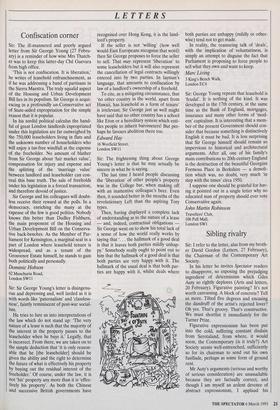Sir: Sir George Young's letter is disingenu- ous and depressing
and, well larded as it is With words like 'paternalism' and 'classless- ness', faintly reminiscent of post-war social- ism.
He tries to lure us into interpretations of the law which do not stand up: The very nature of a lease is such that the majority of the interest in the property passes to the leaseholder when he buys it.' Legally, that is incorrect. From there, we are taken on to the simple deduction that 'it is only reason- able that he [the leaseholder] should be given the ability and the right to determine the future of what is effectively his property by buying out the residual interest of the freeholder.' Of course, under the law, it is not 'his' property any more than it is 'effec- tively his property'. As both the Chinese and successive British governments have recognised over Hong Kong, it is the land- lord's property.
If the seller is not 'willing' (how well would East Europeans recognise that word) then Sir George proposes to force the seller to sell. That may represent 'liberation' to some leaseholders but it will also represent the cancellation of legal contracts willingly entered into by two parties. In layman's language, that amounts to confiscation by law of a landlord's ownership of a freehold.
To cite, as a mitigating circumstance, that `no other country in the world, apart from Hawaii, has leasehold as a form of tenure' is irrelevant. Sir George just as well might have said that no other country has a school like Eton or a hereditary system which enti- tles people to inherit barometers! But per- haps he favours abolition there too.
Edward Hay
16 Worfield Street, London SW11


















































 Previous page
Previous page